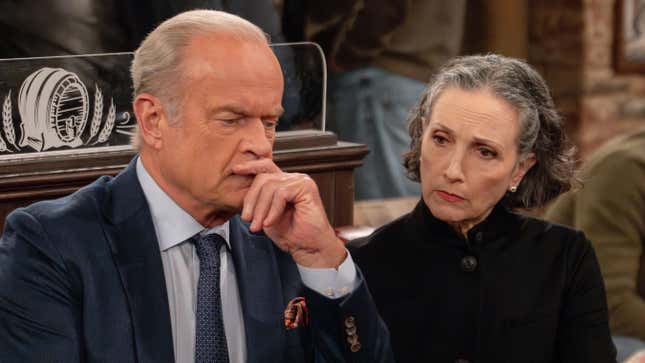
A funny thing happened when I checked in on the Frasier reboot, lo these past two months: I kept watching the damn thing.
I wasn’t expecting to. The whole thing reeked of a vanity project for series star Kelsey Grammer; the show’s first few episodes were hampered by editing weirdness and a certain stilted discomfort from some of its younger cast members; there was no David Hyde Pierce. None of it boded especially well, even for a dedicated fan of the franchise. But as much as I expected to hate the Frasier reboot, or maybe just to “nothing” it, like so many other revivals of shows I loved as an overly nerdy comedy snob kid—ah, whither Murphy Brown?—I kept tuning in, week after week, and laughing while I did it.
Now it’s December, and the show is zooming toward its first-season finale on December 7—Roz is back! Roz!—and I’m as shocked as anybody to report that I’m still getting laughs out of Dr. Crane’s efforts to reconnect with his son, Freddy (Jack Cutmore-Scott, who acquits himself surprisingly well as Grammer’s most regular sparring partner). The show remains an imperfect marriage between its classic sitcom DNA and more modern joke-telling trends—there’s a level of irony at work, often amongst the side characters and sub-plots, that sits ill-at-ease with the series’ strengths—but its basic core is shockingly good.
Grammer is the culprit, really. In the Frasier-obsessive essay I wrote back before the new series launched—raising several questions the show has handled surprisingly well in the meantime—I noted that Frasier was frequently the least-compelling character on Frasier. But Grammer genuinely hasn’t lost a step in the intervening decades: He’s very nearly always the most electrifying presence on the screen and remains beautifully willing to make Frasier look as foolish, childish, or obnoxious as necessary in order to make a good joke land. (A recurring early gag that notes the good doctor’s persistent irritation that his Harvard drop-out son is now “only” a fireman underscores the character’s delightful pettiness, before being expanded for better emotional heft.) Grammer’s continued capacity for silliness is the biggest revelation: The show’s sixth episode, which pays homage to the classic series and its love of farce, sees Frasier briefly wax nostalgic for his old days of complicated, idiotic schemes in order to defraud women into liking him—and there’s a real joy in his eyes as he hearkens back to those old, needlessly complex setups.
The rest of the cast remains a mixed bag, although one with an average that’s been persistently trending upward as the season has gone on. Nicholas Lyndhurst is a long-time veteran of the sitcom wars and acquits himself perfectly as Frasier’s new old best friend, mostly lobbing pithy one-liners from the sidelines and dealing out the occasional hard truth. Cutmore-Scott is more of a slow burn; he’s better at the show’s consistently good dramatic side than its taste for quick-fire comedy, but catches up after a few episodes, as the show eases up on holding Freddy up as a stolid hard-working everyman.
Fellow regulars Toks Olagundoye, Jess Salguiero, and Anders Keith, though, all struggle for large chunks of the season with the very strange TV comedy they’ve found themselves mired within, part throwback, part modern sitcom, and not always sitting at ease between its two poles. As Frasier’s boss, tenant, and nephew, respectively, they’re each asked to take on some very broad characteristics here—especially Keith, who’s essentially doing a Pierce impression for much of his screentime—while also dealing with a rhythm of writing that can uncomfortably jam strained wordplay up against moments of more modern meta commentary. All of them can get the laugh, and do, but unlike Grammer or Lyndhurst, they can’t pull it off when the script, and the editing, are working against them. They get better as the season goes on, but their performances still sometimes highlight the difference between lines that sound like the character being funny and ones where an actor is just delivering a joke from the script.
(It’s worth noting that the single biggest laugh of the entire series for me, to date, came from a line delivered by a guest star, not any of the members of the main cast—although given that said guest star was the brilliant Bebe Neuwirth, whose single-episode appearance was an easy series highlight, it’s hard to necessarily fault the show for that.)
There are, to be clear, no perfect episodes of the new Frasier, or at least not yet (in marked contrast to the old Frasier, which had at least a few pieces of pristine clockwork brilliance spread across its 11 seasons on the air). The editing is messy, with scenes often trailing off to some meandering final joke that doesn’t justify the journey. Side characters (like Freddy’s various fellow firemen) are written with a joke-obsessed simplicity that belies the show’s genuine emotional intelligence. There is no David Hyde Pierce. (I know, I know, I’m harping; I just miss the guy!)
But when it hits—when Grammer and Lyndhurst are firing zingers back and forth at each other, or Frasier and Freddy are taking serious swings at a lifetime of familial resentments, occasionally involving an air-hockey table—it really, truly hits. Having watched nine episodes of it so far, I’ll be happily tuning in for the tenth. And if we hear those renewal blues a-callin’, I’ll be tuning in for a second season, too.
Season one of Frasier is available to stream now on Paramount+.
.